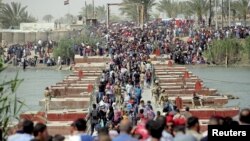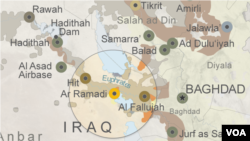As thousands of Iraqis continue to flee the contested area around Ramadi, the capital of Anbar province, the Pentagon says Sunni tribesmen are critical to efforts to secure the area.
Days after the Islamic State group captured three villages on Ramadi's eastern outskirts, the area is still strongly contested by militants and Iraqi Security Forces. Colonel Pat Ryder, a spokesman for U.S. Central Command, which oversees coalition operations there, said the coalition has conducted 17 airstrikes around Ramadi since April 12.
But with small clusters of Iraqi Security Forces spread across the province, Ryder told VOA that Sunni tribesmen are key to mending the gaps between these disconnected forces.
“Having the tribal leaders and the Sunni tribes in the region becoming part of the Iraqi Security Forces, I think over time they’ll be able to provide security and stability in the region, and Prime Minister Abadi had traveled to Anbar recently to provide some weapons to some of those tribal elements, so clearly that is an important part of this strategy,” said Ryder.
IS campaign slows
Despite the Islamic State’s recent gains around Ramadi and the oil fields of Baiji in the north, Ryder said the overall Islamic State campaign has slowed.
"They don’t have the ability that we’ve seen right now to conduct any type of major offensive. You’re not seeing the kinds of operations that you saw last summer in terms of masses of forces,” said Ryder.
Instead, Ryder said, attacks are more hit-and-run with bombings replacing large fighting campaigns.
Kurdish forces in Kobani, Syria, and Iraqi forces north of Baghdad are steadily holding and expanding their ground in the fight against the Islamic State.


